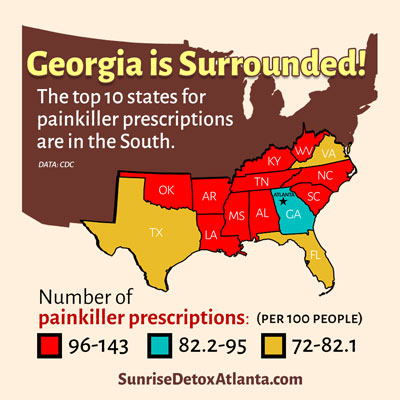
Prescription Pain Killer Addiction in the South (Georgia)
Painkiller Abuse In The South
The State of Georgia is surrounded by prescription painkiller addiction. Recent data from the Centers for Disease Control show Georgia is surrounded by high-prescribing states: states with the highest numbers of prescriptions written for opiate and opioid painkillers (such as Vicodin, Percocet, and other oxycodone and hydrocodone products).
Top Ten States for Painkiller Abuse Are In The South
Alabama, Tennessee, North Carolina, and South Carolina are all on the Top 10 list. Florida to the south is among the lowest in the South, with Texas and Virginia. Florida was first to suffer unregulated prescription pain pill abuse starting in 2010, with a subsequent opiate addiction problem that forces major changes in the way prescribing is monitored and prescriptions are managed.
Georgia Has Been Fighting the Fight
Since the start of the Florida "pill mill" challenges, Georgia has been part of the fight against painkiller abuse and prescription opiate addiction. Early investigations revealed consumers driving from and through Georgia on the way to Florida pill mills.
Later, as Florida clamped down on illicit pharmacies and pill mills, several high-profile actors in the now illegal industry relocated to and operated out of Georgia. It is known that for some time, Georgia filled in for Florida, as the new destination for traveling shoppers from Kentucky, West Virginia, and Tennessee.
Pain Pill Addiction Follows Use
One of the obvious problems is addiction. As the use of prescription opiates increases, so does tolerance. Abusers of oxycodone and hydrocodone, for example, may increase from 2 or 3 pills per day to 10 to twenty, for the same effect. While high-prescribers may allow for increasing tolerance by prescribing more pills, most doctors are now aware of the warning signs (and increased DEA scrutiny).
Once a dependency on pain pills develops, consumers will experience discomfort when they fail to maintain high enough levels of the drug in their systems. The resulting opiate withdrawal symptoms can be harrowing. The severe stomach cramps, vomiting, and overall sickness is enough to drive even those determined to quit, to start using again.
Black Markets Follow Increased Regulation
As we have learned from Florida, New Jersey, and Georgia, if the prescribing of addictive opiates is suddenly shut off by regulation changes or threats of enforcement actions, abusers who have fallen into dependency and addiction suffer severe withdrawal and turn to the black market drug dealers for a continued supply. The impact of well-meaning but poorly-planned regulation is often increased addiction and illegal drug use.
Heroin Addiction Follows Regulation of Prescribing
Heroin is an illegal street drug considered among the most dangerous drugs on earth. Yet we've seen near epidemic proportions of heroin use along the east coast of the US, following regulation of excessive opiate and opioid prescribing.
The truth is that heroin is simply a cheaper, widely-available form of the same drug causing prescription pain killer addiction. And once a user is driven to buy on the black market, a drug dealer will work very quickly to switch a pain pill addict over to more profitable heroin.
The same severe withdrawal sickness that drives so many prescription drug users into buying from friends or the black market, will be exploited by drug dealers to "hook" an addict onto heroin. Purity and dose will be manipulated, and high purity levels can kill users who were switching over from pharmaceutical-grade, highly-controlled controlled prescription drugs.
Addiction Kills. Community Support & Addiction Treatment Saves Lives.
Addiction to heroin and synthetic heroin in prescription pain pills is very serious. Aside from the stigma of drug abuse, the withdrawal sickness and side effects of prolonged addiction are damaging. Drug addiction takes over lives, forcing addicts into a cycle of drug-seeking and using behavior that leaves little time for anything else. Families are destroyed by addiction, and for many, there is a complete loss of hope. Isolation and increasingly risky behavior follow, often leading to death.
Help Is Available, And It Does Work. Medical Detox First.
Medical detox from prescription opiates and opioids takes from 3 to 10 days for most people, depending on the amount and type of drugs used, the length of time using them, and any underlying mental or physical disorders that must be accommodated (such as combinations of drugs, including sleeping pills and anxiety drugs).
Medical detox is required before admission to many treatment programs, often by law. So getting into detox is the first step for anyone seeking help with a pain pill or prescription drug addiction. At Sunrise Detox, clients start counseling during their detox stay.
In most cases, once the medical detox protocol is established and the addiction is under the control of the medical staff, our focus is on ensuring comfort and community support. With on-site nursing staff and the most comfortable facility in the region, we will do whatever we can to support you, including preparing you for an addiction treatment program suitable for your situation and health status. Call us now! (678) 928-6557
